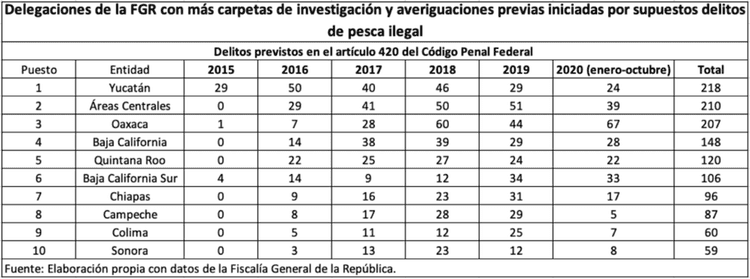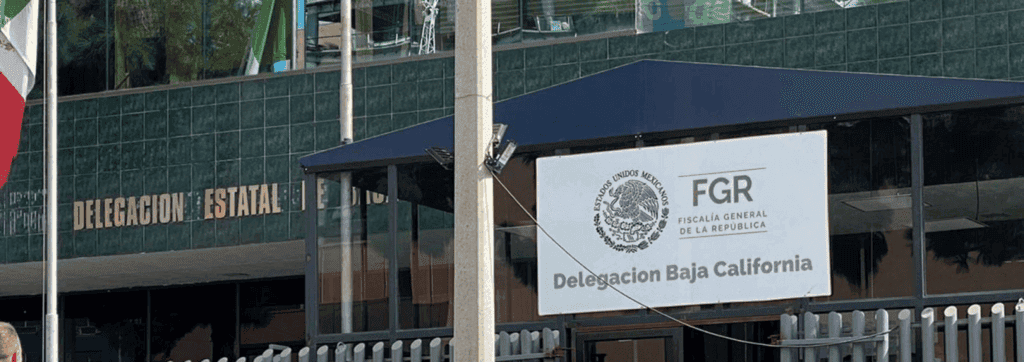During the current federal administration, the Attorney General's Office (FGR) has more than 800 research kits related to illegal fishing. A necessary way, although not sufficient on its own, to deter the commission of this type of crime, they considered experts.
Between January 2019 and October 2020, 842 investigation kits were initiated for crimes related to illegal fishing, in which the crimes defined in one of the fractions of article 420 of the Federal Penal Code would have been committed.
Thus, in 22 months, the numbers achieved in 2017 and 2018 were exceeded, since between the two years the Public Prosecutor's Office added 806 investigation kits for crimes related to illegal fishing, according to information from the Directorate of Statistics provided in a request for information.
“Research plays an important role, however, it is a subject that has to do with different human dimensions and each of these must be explored... It would be wrong to speak homogeneously,” said Camilo Thompson, lawyer for the Marine-Coastal Resources Protection Program of the Inter-American Association for the Defense of the Environment (AIDA), about illegal fishing.
The wide range of illegal fishing ranges from those who engage in it because they do not have a permit or a current one; that carried out outside national jurisdiction; fishing for species that have protection; that carried out through unauthorized fishing nets; and to those where mafias and illegal networks are involved, among others, Thompson listed.
The new criminal justice system met its implementation deadline on June 18, 2016, and in the process, research kits began to play a major role over the so-called preliminary investigations.
Most of the FGR investigations related to illegal fishing in the last five years correspond to 802 research kits or preliminary investigations initiated by the assumptions of section IV of article 420 of the Federal Criminal Code, which speaks of trafficking activities to introduce or remove specimens or by-products of vulnerable aquatic species from the country. 
Without considering previous inquiries, the FGR delegations that reported the most research kits, between 2015 and October 2020, are Yucatán with 218; Central Areas (headquarters), 210; Oaxaca 207; Baja California, 120; and Quintana Roo, 106. 
Intergovernmental effort
Combating illegal fishing requires intergovernmental efforts. The Plan of Implementation for the Zero Tolerance Zone and the Refuge Area for the Protection of Marine Vaquita Vaquita was just published in the Federal Official Gazette, in which various authorities in the Upper Gulf of California participate.
Thompson said that intergovernmental efforts have been seen before, with the difference that this time the Secretariat of the Navy comes into operation.
The plan also incorporates the Financial Intelligence Unit (FIU), which is part of the Ministry of Finance and Public Credit (SHCP) in efforts to block accounts suspected of money laundering.
“In effect, this body comes in to monitor the flow of resources. Totoaba is on a black market, the export and commercialization of species that are part of the CITES (Convention on International Trade in Endangered Species of Wild Fauna and Flora) is internationally regulated and this is not allowed... in terms of financial intelligence, that is, identifying the flow of resources that may be benefiting these criminal chains to change the cut of the fuse. I do see that it has a congruence (the participation of the FIU),” said Thompson.
A few days ago, during the launch of the WildLife project of the United Nations Office on Drugs and Crime, Mireya Valverde Okón, director general of Regulatory Affairs at the FIU, highlighted that there are 179 reports that indicate that 219 people could be involved in crimes against wildlife, including fishing for marine species, according to information published in the newspaper El Economista.
Beyond persecution
A comprehensive approach, beyond mere criminal prosecution, is key to being able to combat several evils that fuel illegal fishing, said Thompson, who highlighted the need for fisheries management.
“Mexico has a deficit in the management of its fisheries, 20 or 25% of its fisheries are somehow ordered, the rest are not. There are species that are in the National Fishing Charter with their record and monitoring has been carried out and they have good arrival notices; and there is some control over issues of incidental fishing, but there is another species that is not,” Thompson lamented.
It is possible that for every fish that is consumed legally in Mexico, there is another that is sold illegally, says Mariana Aziz, director of Fisheries Transparency Campaigns at the civil organization Oceana.
For this reason, a traceability policy is important that allows the fishery product to follow the path, from capture to commercialization in the last phase of the value chain.
“The administration of justice, but we also see opportunities in other tools that prevent illegal fishing from the start, that is to say that it never happens,” Aziz said.
Part of these tools is to open up satellite vessel monitoring data to the Global Fishing Watch platform, he said.
Today around 2,000 vessels are monitored in real time within the Satellite Monitoring System for Fishing Vessels (SISMEP), but they only represent 2.5% of the total registered vessels.
“Through satellite monitoring, you can have a complete view of everything that is happening at sea, and because we believe that these data should be public and open, not only so that Global Fishing Watch can contribute to surveillance,” said Aziz and thus avoid gigantic deployments at sea.
In March of last year, the Morena caucus proposed a bill in the Chamber of Deputies to transfer inspection and surveillance responsibilities to the Secretariat of the Navy. However, the proposal has not resonated with civil organizations.
“Passing the ball from one authority to another will not have significant impacts in the fight against illegal fishing, because we are still without essential tools... without a regulation, without a fishing census, there is still no traceability policy, the data from the satellite monitoring system is still closed and people cannot know what is really going on out there,” said Aziz.



Comentarios (0)